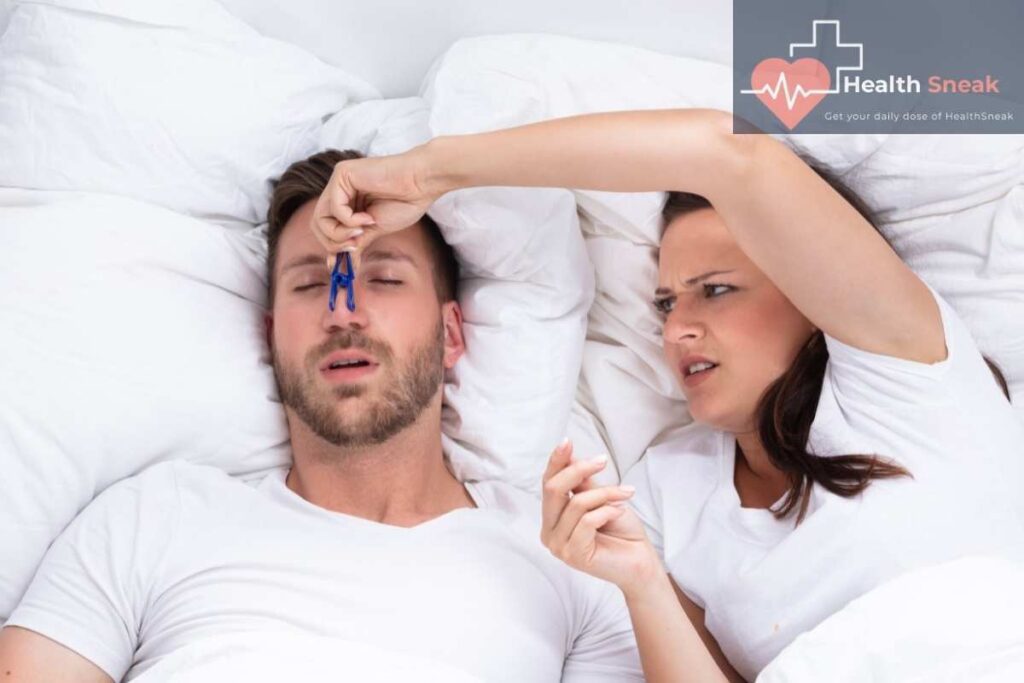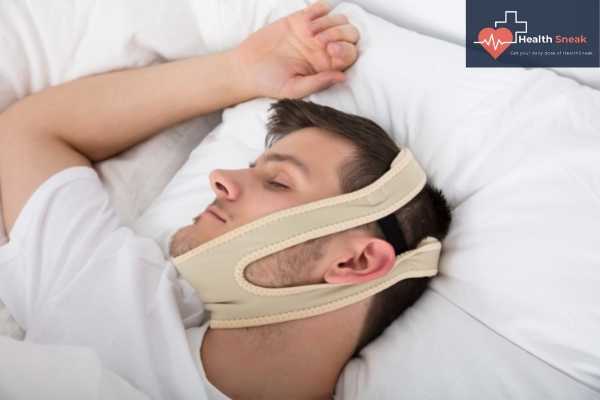If you’ve ever been assured by your partner that you don’t snore, but then you hear it in the middle of the night, you’ve probably been the victim of a snoring hoax. Although it’s no fun to wake up with a sore throat or headache, feeling like you’ve been run over by a truck, it’s much worse when you hear it’s hard to pinpoint the cause of your snoring. It can be really frustrating to try to find a way to stop snoring without having to resort to surgery. But, don’t worry! We’ve got the tips you need to find a solution to your snoring problem.

What is Snoring?
The term “snoring” is used to describe the vibration of soft tissues in the upper airway due to partial obstruction in the airflow. You can hear the sound of snoring in an otherwise silent room. Most people snore, and as many as 90% of men and 75% of women snore. It is typically thought of as a problem only when it becomes persistent, loud or if it is significantly disruptive to others. Canada has an entire snoring hotline.
Symptoms of Snoring
Symptoms of snoring are primarily difficulty breathing, but others are restless sleep, fatigue, sleep apnea, and heavy sleep. Symptoms of snoring are usually more noticeable at night or when sleeping at home. It is a common sleep problem characterized by excessive and noisemaking breathing that occurs when someone is sleeping due to the relaxation of the muscles in the throat and mouth. When we sleep, our muscles relax and stop breathing for periods. People with snoring issues, though, typically experience difficulty breathing. At the same time, they sleep, and they can’t get enough oxygen because it is caused by the tissues of the throat and mouth blocking the passage of air. Snoring can come from a large number of sources.
Causes of Snoring
People have been struggling with snoring for centuries, so it’s no surprise that the cause of snoring has been heavily debated. Scientists have proposed two primary theories to explain the reasons for snoring. The first theory is that the person’s upper airway becomes restricted. The second theory is that the person has an obstruction to airflow at the fluid levels in their throat.
Other factors for snoring are smoking, excess body weight, excess alcohol intake, excess caffeine intake, nasal congestion, deviated septum, enlarged tonsils, enlarged adenoids, or stomach problems. The most common cause of snoring is obstructive sleep apnea (OSA) when breathing is interrupted during sleep. OSA is often related to obesity, though it also occurs in many non-obese people.
Other causes include mouth breathing, allergies, nasal congestion, asthma, or other medical conditions that make it harder for them to breathe through their nose, which can cause them to snore. There are a few things that can often cause people to snore. These things could be something that a person is doing wrong, such as drinking too much alcohol, smoking cigarettes, or something that the person is exposed to, such as being in an airplane or a sleeping bag for an extended period. If someone is snoring, they might not be feeling very well because they’re not getting enough rest.

Common Factors of Snoring
Many different factors can contribute to snoring. These factors include sedentary lifestyle, nasal congestion, tongue size, tonsil size, alcohol consumption, caffeine, or any allergies causing nasal congestion.
- Excess weight
- Oral problems
- Alcohol consumption.
- Sleeping on the back
- Family history of snoring
- Resting on one’s stomach
- Sleep apnea (causes suppressed breathing or pauses in breathing)
- Obesity
- Certain medications
- Abnormal breathing habits
- Nose-blocking Certain prescription medications or illegal drugs may also cause snoring.
Risk Factors of Snoring
There are several risk factors that people might experience. Some of these might include chest pain, throat pain, and pain in the lower back. Snoring may also cause breathing issues, obesity, and heart disease. If you are experiencing any of these symptoms, it is essential to see a doctor.
Complications involved with Snoring
If you or someone you love has been dealing with the symptoms of snoring and the lack of sleep that accompanies this condition, you might be wondering what can be done. While the symptoms of snoring and the lack of sleep may seem harmless, they can take a toll on your health. Not only does it deprive you of the essential hours of sleep you need every day, but it also increases your risk for several problems such as high blood pressure, obesity, and diabetes. If left untreated, these problems can lead to even more severe health issues and deadly. Snoring causes a lack of sleep, and a lack of sleep causes a lack of energy the next day. Sleep deprivation can have negative consequences, such as lack of focus, irritability, difficulty concentrating, headaches, and low mood.
How to Prevent Snoring?
It would help if you considered the following risk factors to prevent snoring:
- Obesity: Obesity is a significant factor in snoring and is the leading cause of the condition.
- Weight gain around the neck and throat can push tissues and muscles inwards and cause obstruction.
- Alcohol: Alcohol can cause swelling in the throat’s soft tissues, which can contribute to snoring by blocking the airway. If you are one of those people who are prone to snoring, alcohol is a no-no for many reasons, but one of them is that it can help you to snore more.
- Stop smoking: Some people have said that cutting out cigarettes has helped them immensely, as bizarre as it sounds.
Treatments for Snoring
When snoring becomes a problem, it is crucial to speak with your doctor to see what can be done. Many factors can be involved in snoring-the most common of which is the narrowness of the airway. Other conditions such as nasal congestion, sleep apnea, and some types of arthritis can also cause snoring. Your doctor may recommend that you try one or more of the following remedies for your snoring problem:

Dental Appliances
These are designed to keep your jaw forward, creating more space in the airway.
Nasal Airway Devices
These are typically used to keep the nasal passages open and transparent.
Medicinal Treatment
Medical treatment is typically used to treat snoring uses a drug called a nasal decongestant. These drugs work by reducing the amount of fluid in the nasal passages, leading to a reduced amount of congestion and thus reduced snoring. These drugs are typically taken as a pill, and patients can expect relief from their symptoms after one to two days of use.
There are different ways to treat OSA, but the best thing to do is see a doctor. If you have to snore, the doctor might give you a device to try and stop your snoring. Sometimes, if you have OSA, you might need to take medication to help with your snoring. There are a few things you can do to stop snoring. One is to get a night of good quality sleep, and a good night’s sleep will help slow down your breathing and reduce the chances of snoring. Another is to eat a healthy diet. Eating healthy foods will help keep your body healthy and help reduce snoring. Include mouth breathing, allergies, nasal congestion, asthma, and other medical conditions.
Devices
There are several ways to treat snoring. One way is to use a CPAP machine. These are expensive, but they are also effective. A CPAP machine requires the user to wear a mask over the nose or mouth while they sleep, and it maintains a steady stream of air so you can sleep comfortably. There is also a nasal dilator that works by widening the nasal cavity. This dilator is sold over-the-counter and can be very effective. One of the snoring devices you might have heard about is the Chippendales. It is a plastic bracket that can be attached to the headboard or footboard of your bed so that your partner can’t roll over you when you are just getting started on your snore journey.
The other popular devices are called mandibular advancement devices, or MADs for short. These are plastic mouthpieces made to fit your teeth. The device is held in place by straps that wrap the back of your head, preventing your jaw from moving up and down. For this reason, MADs are known to be popular with people who have problems with their TMJ. Sleep apnea machines are also an alternative to MAD. The American Academy of Otolaryngology recommends an inhaler. Another method requires you to put Eucalyptus Oil on your pillowcase.
Lifestyle Changes
Lifestyle changes can improve your snoring. If you or someone you know is snoring excessively and it’s interrupting your sleep, there are several things you can do to stop this from happening. Dr. Jamie C. Grant of the American Academy of Sleep Medicine recommends some lifestyle changes and some changes to your bedroom as some of the top remedies to help stop snoring. It includes losing weight, lowering your alcohol consumption, and getting up to walk for 5 minutes every hour to help lubricate your throat and nasal passage.
There have been many changes in how people sleep in the last few years, including things like the introduction of the use of laptops and tablets as bedside tables and the use of tablets and phones as alarm clocks. When you use electronics in bed, it’s impossible to get the right balance of supporting the head, neck, and back all at once, which can lead to problems with snoring. Additionally, increasingly warmer temperatures are causing more people to use their central heating systems and are another factor that can be managed in our lifestyle.
Surgery
The best treatment for snoring is surgery. The surgery for snoring has been available since 1997 and is well-accepted among patients and doctors. This procedure is also an excellent option for those seeking to improve their quality of life. Doctors can do surgery without anesthesia, typically taking about 20 minutes, and is generally outpatient. Typically, people diagnosed with sleep apnea are recommended to undergo surgery. There are numerous types of surgical treatments.
Types of Surgery Procedures:
There are various surgery to treat snoring.
Thermal ablation palatoplasty
Thermal ablation palatoplasty is surgery that removes or alters the soft tissue that can cause snoring. This surgery is meant for those who snore due to oral tissues, not those who snore due to an obstructed throat.
Uvulopalatopharyngoplasty
For some people, Uvulopalatopharyngoplasty, or UP3, is an option that can provide relief. UP3 is a type of surgery that realigns the tissues inside the palate, throat, and tonsils to decrease the airflow resistance
Laser-Assisted Uvulopalatoplasty
The laser-assisted uvulopalatoplasty (L-AUP) procedure was a prevalent option to help people stop snoring. The L-AUP procedure involves a small laser being inserted through the mouth and gently burned to the throat’s tissues, and the laser does not burn the muscle or destroy the tissues.
Somnoplasty
Snoring surgery is a surgical procedure that uses radiofrequency heat energy to remove the uvula and soft palate tissues, so they are hard to vibrate. That can help reduce the noise that you can hear when you snore. The surgery is usually done in a hospital setting and can last up to two hours.
What are the Best Sleep Positions for Snoring?
The best sleep positions open the airway and reduce the likelihood of snoring. It is essential to choose a bed with a soft but firm mattress and sleep on the body’s side with an elevated head. The natural body position with an elevated head is on your side with your knees bent, and your head turned to the side.
How Yoga can treat Snoring?
Yoga, which means “yoking” or “union,” is a spiritual tradition that brings together two complementary aspects of life- the spiritual and the physical. Yoga can improve sleep quality because it can strengthen the respiratory muscles, and yoga is one of the most comprehensive and effective methods of preventing and eliminating snoring. Yoga stretches the muscles in the throat and mouth, which can help you breathe better and snore less.
There are a few yoga poses that may be able to help. Pratyahara is a pose where you close your eyes and use your hands as earplugs to block sound. Padmasana is a pose where you sit on your heels and wrap your arms around your shins. This pose will reduce the vibration of the nasal passage. Yoga for sleep can also help you not to snore. First, sleep on your back, also known as “supine position.” and keep your tongue pressed against the roof of your mouth, which will help prevent it from falling back into your throat.
In conclusion, there are many different treatment options available to help stop snoring; therefore, your partner or loved ones should not lose all hope just yet. Although the most frequently recommended methods are those that can be done at home. Experts reminds us that people should not do anything that is risky or unsafe for them. Through fitness and lifestyle changes, a change of habits can also contribute to a change in breathing – something that could go a long way in reducing the problem of snoring. Making sure to find the cause of your partner’s snoring is key to finding an effective solution for everyone involved.
Read more about:
How to treat Dandruff | Best Treatment of Rheumatoid Arthritis | Epiphyseal Plates | Excedrin Migraine | Treatments of Cervical Strain
Treatment of Chilblains | Benefits of Lemon Tea | Hair Transplant Cost | Benefits of Peanuts | Wrist Blood Pressure Monitor
Treatments of Morning Sickness | Benefits of Pomegranate Tea | Treatment of Asthma | Overhydration | Is whey protein safe to drink
Cerebral Infarction | Pomegranate Tea | How to survive Heart Attack | Benefits of Peanuts
